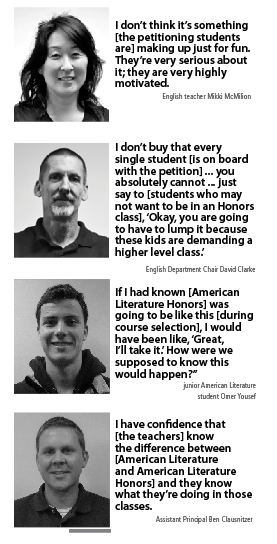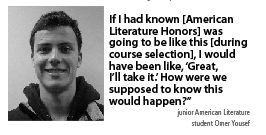“Have you ever heard of any Honors course at [MVHS] where people say, ‘Oh, that’s so much easier than the non-honors?'”
English teacher Mikki McMillion answers her own question—she hasn’t.
This year, however, her fifth period American Literature class is fighting to prove that they are working just as hard as students in American Literature Honors classes, if not harder. The 29 juniors have been engaged in dispute with administration for nearly five weeks trying to prove that their course merits an honors level title due to its rigor in comparison with that of Honors.
After hearing from friends in American Literature Honors that the course was turning out to be far easier than expected, students of McMillion’s fifth period began to compare the work done in both classes through word of mouth.
Junior Rohan Yelsangikar eventually wrote a petition titled “Notification of Disparity” to submit to administration. While the class discussed their frustrations with McMillion, both she and her students say she listened but was not in any way involved with the students’ actions.
The petition argued that at that point, American Literature Honors had submitted a single essay outline, had only read “The Crucible”, and had completed ‘a few discussions’ — a phrase the petition quoted from an unnamed American Literature Honors student. On the other hand, McMillion’s fifth period American Literature class says in the petition that they had completed two full essays, read four short stories, and were “well into” “The Crucible” as well.

Administration responds
The petition was signed by every student in McMillion’s fifth period American Literature class and submitted to administration in early October.
The fifth period American Literature class, all, during course selection, signed up for American Literature, and they are currently in American Literature, and their teacher has stated that she is teaching American Literature,” Clausnitzer said.
He said that he had “good conversations” with American Literature and American Literature Honors teachers, but declined to discuss the details. English Department Chair David Clarke said he was also consulted.
“I have confidence that [the teachers] know the difference between [American Literature and American Literature Honors] and they know what they’re doing in those classes,” Clausnitzer said.
He and Principal April Scott talked to McMillion’s fifth period class on Oct. 21.
“Now we’re talking two grading periods into the semester, so the class is remaining an American Literature class,” Clausnitzer said.
In response, the students drew up a second petition, “A Protest Against Administrative Proceedings,” rebutting many points brought up in that 10 minute conversation.
For many students, the decision to take American Literature instead of its Honors counterpart was based on the workload of American Literature Honors classes in past years. For others, the decision was made to avoid taking the infamous AP U.S. History and American Literature Honors combination, which during course selection, is generally warned against by teachers, counselors and administration alike.
“If I had known [American Literature Honors] was going to be like this [during course selection], I would have been like, ‘Great, I’ll take it.’ How were we supposed to know this would happen?” Yousef said.
He believes the American Literature Honors classes are different this year because of “new teachers and a completely different way of teaching,” referring to the fact that both American Literature Honors teachers, Chelsa Anderson and Terri Anderson have not previously taught American Literature Honors at MVHS. Both teachers declined to comment.
But Clarke finds nothing wrong with the new approach to American Literature Honors classes this year. He believes that students have come to expect Honors and AP classes to be “a trainwreck” in the first few weeks before grades start to improve.
“I don’t think it’s been a trainwreck in American Literature Honors [this year] and that doesn’t mean it’s not a demanding, academically accelerated course — it just means [the teachers] have chosen a different way to deliver their students into the material,” Clarke said. “[But] I think that’s where students are coming from — ‘if the American Literature Honors students aren’t freaking out, there must be something wrong.'”
Undefined differences between regular and Honors classes
The petition also stated that Clausnitzer had told the class American Literature Honors had written four essays, and cited a survey created by junior Mihir Patil to attempt to refute that point. The survey asked American Literature Honors students how many essays (defined as four to five paragraphs with a thesis that was submitted for grading) they had written. It was publicized on School Loop and Facebook, among other social networking sites. In total, 32 students responded and responses varied greatly from zero to six, but none of the responses said four.
After Clausnitzer spoke to the class and asked students with further questions to make an appointment to see him, Patil and Yelsangikar were the only two students who asked to do so.
But Clausnitzer doesn’t believe that essays alone can define the rigor of a class, and he reiterated that teachers are professionals who he trusts know the differences between the two classes.
The difference between the two classes, he says, includes “a teacher’s thumbprint and personality … depth of analysis and other activities.” According to him, administration does not and should not have guidelines for the difference between the two classes.
For students, the only concrete way to define the difference between American Literature and American Literature Honors is to judge workload and assignments.
“Sure, essays are not what make a class harder or easier but [American Literature as a whole] you can’t change up the books we read, so [determining rigor] comes down to the assignments we do. American Literature is tougher than we expected, but we can deal with it. We’re just saying, “Look, we’re studying at an equal level [with American Literature Honors students] here so make the title the same,'” Yousef said.
While Yousef and other students say that the entire class is behind the petitions, Clarke does not buy it, saying that in a regular level American Literature class, there certainly will be students who cannot handle or explicitly chose not to have to handle an Honors level class.
“You absolutely cannot … just say to [students who may not want to be in an Honors class], ‘Okay, you are going to have to lump it because these kids are demanding a higher level class,'” Clarke said.
Future steps for teachers and students
According to McMillion and American Literature teacher Lynn Rose, teachers of American Literature Honors and American Literature have not met to discuss their courses. In past years, they say, American Literature, American Literature Honors and American Studies teachers met to discuss curriculum, binders and lesson plans, but they have not met this year.
“[Those meetings] would be helpful in clarifying the distinction between the courses,” Rose said.
According to Clarke, the teachers have met to discuss the use of “The Adventures of Huckleberry Finn” in general American Literature curriculum, and meetings like those, which discuss specifics in context of a courseís curriculum, are useful. He believes, however, that additional conversations about curriculum will be necessary in the future.
The second petition was submitted on Oct. 25. According to Patil, they haven’t yet received an official response from administration.
The next step for the American Literature students, who say they do not plan on giving up, is rallying parental support and arranging a meeting with Scott in the near future.
Read the full text of the first and second petitions here.





